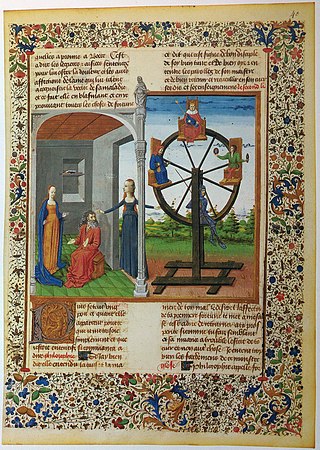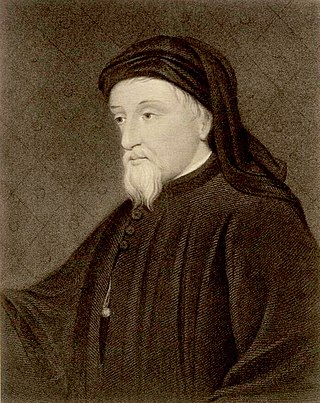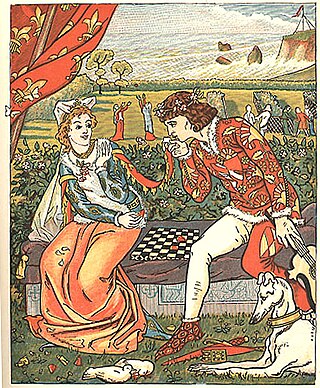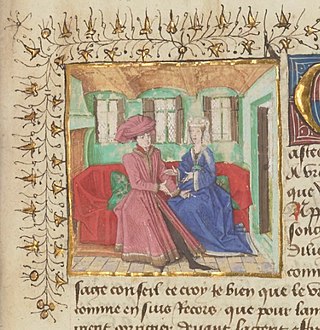Related Research Articles

On the Consolation of Philosophy, often titled as The Consolation of Philosophy or simply the Consolation, is a philosophical work by the Roman philosopher Boethius. Written in 523 while he was imprisoned by the Ostrogothic King Theodoric, it is often described as the last great Western work of the Classical Period. Boethius' Consolation heavily influenced the philosophy of late antiquity, as well as Medieval and early Renaissance Christianity.

Geoffrey Chaucer was an English poet, author, and civil servant best known for The Canterbury Tales. He has been called the "father of English literature", or, alternatively, the "father of English poetry". He was the first writer to be buried in what has since come to be called Poets' Corner, in Westminster Abbey. Chaucer also gained fame as a philosopher and astronomer, composing the scientific A Treatise on the Astrolabe for his 10-year-old son Lewis. He maintained a career in the civil service as a bureaucrat, courtier, diplomat, and member of parliament.

Anicius Manlius Severinus Boethius, commonly known as Boethius, was a Roman senator, consul, magister officiorum, historian, and philosopher of the Early Middle Ages. He was a central figure in the translation of the Greek classics into Latin, a precursor to the Scholastic movement, and, along with Cassiodorus, one of the two leading Christian scholars of the 6th century. The local cult of Boethius in the Diocese of Pavia was sanctioned by the Sacred Congregation of Rites in 1883, confirming the diocese's custom of honouring him on the 23 October.

"The Franklin's Tale" is one of The Canterbury Tales by Geoffrey Chaucer. It focuses on issues of providence, truth, generosity and gentillesse in human relationships.
A fabliau is a comic, often anonymous tale written by jongleurs in northeast France between c. 1150 and 1400. They are generally characterized by sexual and scatological obscenity, and by a set of contrary attitudes—contrary to the church and to the nobility. Several of them were reworked by Giovanni Boccaccio for the Decameron and by Geoffrey Chaucer for his Canterbury Tales. Some 150 French fabliaux are extant, the number depending on how narrowly fabliau is defined. According to R. Howard Bloch, fabliaux are the first expression of literary realism in Europe.
Anglo-Norman literature is literature composed in the Anglo-Norman language and developed during the period of 1066–1204, as the Duchy of Normandy and the Kingdom of England were united in the Anglo-Norman realm.
Jean de Meun was a French author best known for his continuation of the Roman de la Rose.
"The Tale of Melibee" is one of The Canterbury Tales by Geoffrey Chaucer.
Boece is Geoffrey Chaucer's translation into Middle English of The Consolation of Philosophy by Boethius. The original work, written in Latin, stresses the importance of philosophy to everyday life and was one of the major works of philosophy in the Middle Ages. As well as using philosophy to understand and deal with hardship, it is also an attempt by Boethius to improve the minds of the people in 6th century Rome by introducing them to Greek philosophy.
The Book of Sydrac the philosopher, also known as the Livre de la fontaine de toutes sciences is an anonymous philosophical work written between 1270 and 1300 in Old French. It was enormously popular through the 16th century and received translations into numerous languages, among which was the late-medieval English translation called Sidrak and Bokkus.
Albertanus of Brescia was an author of Latin social treatises and sermons.

Le Ménagier de Paris is a French medieval guidebook from 1393 on a woman's proper behaviour in marriage and running a household. It includes sexual advice, recipes, and gardening tips. Written in the (fictional) voice of an elderly husband addressing his younger wife, the text offers a rare insight into late medieval ideas of gender, household, and marriage. Important for its language and for its combination of prose and poetry, the book's central theme is wifely obedience.

Godfrey of St. Victor was a French monk and theologian, and one of the last major figures of the Victorines. He was a supporter of the study of ancient philosophy and of the Victorine mysticism of Hugh of St. Victor and Richard of St. Victor.
Pierre Cally was a French Catholic Cartesian philosopher and theologian.

Catherine d'Amboise was a prose writer and poet of the French Renaissance. She wrote both verse and novels, including Book of the Prudent and Imprudent [Livre des Prudents et Imprudents] (1509) and Fainting Lady's Complaint against Fortune [La complainte de la dame pasemée contre Fortune] (1525), as well as royal song [chant royal], which is the only extant poem of its genre.
Walford Dakin Selby (1845–1889) was an English archivist and antiquary.
The Old English Boethius is an Old English translation/adaptation of the sixth-century Consolation of Philosophy by Boethius, dating from between c. 880 and 950. Boethius's work is prosimetrical, alternating between prose and verse, and one of the two surviving manuscripts of the Old English translation renders the poems as Old English alliterative verse: these verse translations are known as the Metres of Boethius.

Anne de Graville or Anne Malet de Graville (c.1490–c.1540) was a French Renaissance poet, translator, book collector, and lady-in-waiting to Queen Claude of France. She hailed from one of the most prominent families in the country, and overcame scandal to become a well respected literary figure at the royal court. In addition to authoring two texts, she was an avid collector of books and manuscripts.

Jonathan Fruoco, FRHistS is a French historian who specializes in medieval English literature, with a specific focus on the polyphony of Geoffrey Chaucer's poetry, and historical sociolinguistics. In 2022, he was elected a Fellow of the Royal Historical Society.
References
- ↑ "Renaut de Louhans (12..-13..) - Auteur - Ressources de la Bibliothèque nationale de France". data.bnf.fr (in French). 2020-09-22. Retrieved 2020-11-19.
- ↑ Rita Copeland, "Renaut de Louens", in Medieval France: An Encyclopedia, edited by edited by William W. Kibler, Grover A. Zinn, Lawrence Earp and John Bell Henneman Jr. (Routledge, 2016), p. 795.
- ↑ F. Nagel, "Die altfranzösische Übersetzung der Consolatio philosophiae des Boëthius von Renaut von Louhans", Zeitschrift für romanische Philologie , 15 (1891), pp. 1-23.
- ↑ Curt F. Bühler, "The Morgan manuscript (M 39) of 'Le livre de Melibee et de Prudence'", in Studies in Language and Literature in Honour of Margaret Schlauch (New York, Russell and Russell, 1971), pp. 49-54.
- ↑ Dominick Grace, "Telling differences: Chaucer's 'Tale of Melibee' and Renaud de Louen's 'Livre de Melibee et Prudence'", Philological Quarterly , 82:4 (2003), pp. 367-400.